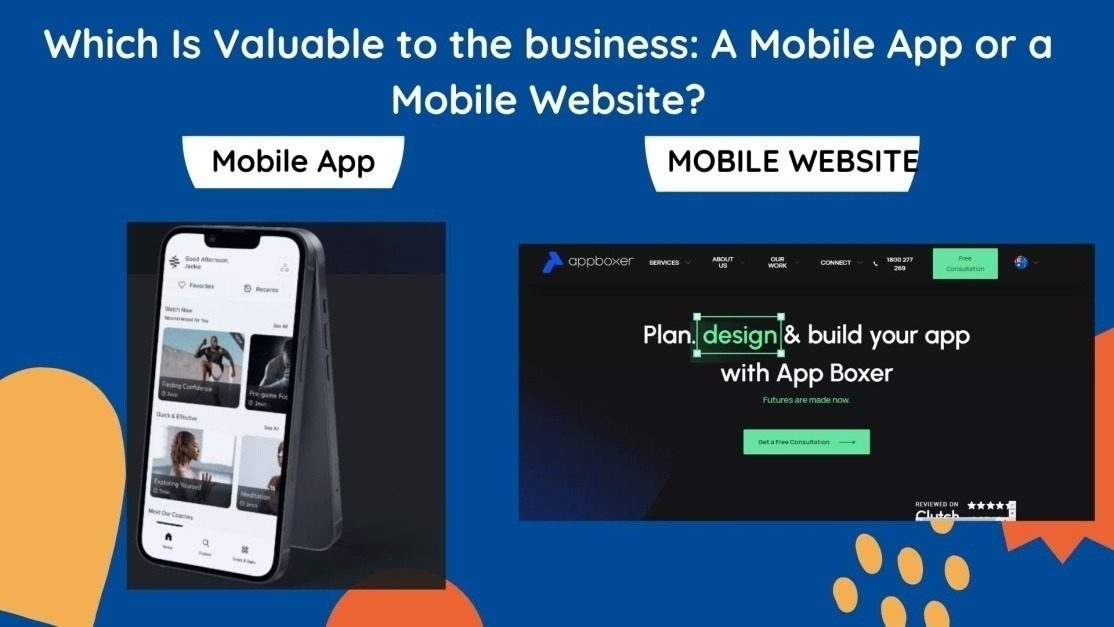
One of the first questions you’ll probably ask yourself, if you want to give your company or organization a mobile presence is whether you should build a mobile app that customers can download, a mobile website they can access, or both. A variety of considerations, such as target audiences, available budget, intended purpose, and necessary features, will determine which mobile website or app is best for your purposes. Mobile websites and apps might initially appear to be quite similar.
Mobile applications and mobile WebPages are both accessible via smartphone or tablet computers. However, a website is exactly what it sounds like: a collection of internet browser-based HTML pages linked together to offer information about a brand’s services and goods. Nowadays, receptive websites are the most common. They are built specifically for a given platform and are used to a range of display sizes and formats.
Why Mobile App or Mobile Website is Valuable to the Business?
Business mobile app or Mobile Website is essential in today’s marketplace for all businesses, regardless of industry or size. Many small business owners believe that an app is overpriced and that their traditional website is sufficient for business marketing. Such owners are mistaken because small businesses can profit from app development as well. With the growing popularity of mobile search and browsing, creating an app or website can be extremely beneficial to your small business.
Many people believe that a mobile website offers various advantages over any form of mobile app, while others believe the opposite. So who is correct?
Let’s look at if a mobile application or a mobile website is better for your firm:
Pros and Cons of Mobile Website:
When we say mobile website, we don’t mean a separate website for your services, but rather a responsive design that will work on all devices. It is critical to have a mobile web site since all content must be visible to visitors.
Pros:
- It is less expensive than an app since the costs are incorporated when the website is built. There is no further expenditure required.
- There is no need for a separate iOS/Android website.
- There is no requirement to submit the site to the App store; all you need is a domain name and some organization. .
Immediately and instantly accessible.
Cons:
- It is not accessible offline.
- If the website is updated with the most recent update, no alert will be generated.
- If it is not constructed properly, it may cause a variety of issues such as poor use, chaotic style, and so on.
Pros and Cons of Mobile Application:
Pros:
- You could instantly send messages to user by push notification.
- Offline accessible.
- Better user interface and user experience.
You could analyze app user data more accurately.
Cons:
- Having an app that I can think of is that it requires more money. Some applications are inexpensive, but you must pay for them. Then you must submit it to the Application store to make it available to your users.
- Developing an app is more expensive than creating a website with the same functionality.
- According to a report, Apps are being downloaded but not being used by users. The average user utilizes 9 mobile applications daily and 30 apps monthly. If an average Smartphone user has 80 applications installed, then more than 62% of those apps aren’t used on a monthly basis. In actuality, 25% of downloaded programmers are only used once and never utilized again.
Conclusion:
Ultimately, it totally depends on your business services to choose any of these. Some services will require merely a website, while others would demand both. If you want to increase your business presence to a particular audience then mobile application is definitely can be your first choice now a days. But if you want to target a widest range of audience then you can go with mobile web because now a day’s people don’t want to pack their Smartphone’s with plenty of mobile application. Almost half of the Google searches are for local businesses.
At App boxer, we realize the significance of our clients’ businesses and the people they serve, and we help them create quick, flexible, and future-oriented apps that help them thrive and stay ahead of the competition. Our team has years of experience working with Android apps and is well-equipped to deal with fragmentation issues and the complexity of Android products and software.








